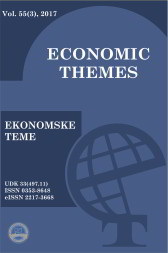Economic Themes (2017) 55 (3) 1, 305-318
Vesna Bucevska
Abstract: This paper presents an empirical investigation of a large number of potentially significant determinants of current account deficits in five EU candidate and potential candidate countries (Albania, Croatia, Macedonia, Serbia and Turkey) in the period 2005 Q1-2015 Q4. Using panel regression techniques we find that current account imbalances in the EU candidate and potential candidate countries are mainly determined by real GDP growth rate and the degree of trade integration. Other factors that have a significant impact on current account balances include relative per capita income, crude oil trade balance and level of financial development. Interestingly, the status of the observed country (an EU candidate or a potential candidate country) does not have any effect on the current account balance. It is expected that further economic and financial development of the EU candidate and pre-accession would encourage domestic saving and contribute to improvement of their current account positions.
Keywords: Current account deficit; current account determinants; the EU candidate and potential candidate countries; panel regression techniques
CURRENT ACCOUNT DEFICITS IN THE EU CANDIDATE AND POTENTIAL CANDIDATE COUNTRIES: A PANEL ANALYSIS
Vesna Bucevska
Abstract: This paper presents an empirical investigation of a large number of potentially significant determinants of current account deficits in five EU candidate and potential candidate countries (Albania, Croatia, Macedonia, Serbia and Turkey) in the period 2005 Q1-2015 Q4. Using panel regression techniques we find that current account imbalances in the EU candidate and potential candidate countries are mainly determined by real GDP growth rate and the degree of trade integration. Other factors that have a significant impact on current account balances include relative per capita income, crude oil trade balance and level of financial development. Interestingly, the status of the observed country (an EU candidate or a potential candidate country) does not have any effect on the current account balance. It is expected that further economic and financial development of the EU candidate and pre-accession would encourage domestic saving and contribute to improvement of their current account positions.
Keywords: Current account deficit; current account determinants; the EU candidate and potential candidate countries; panel regression techniques

